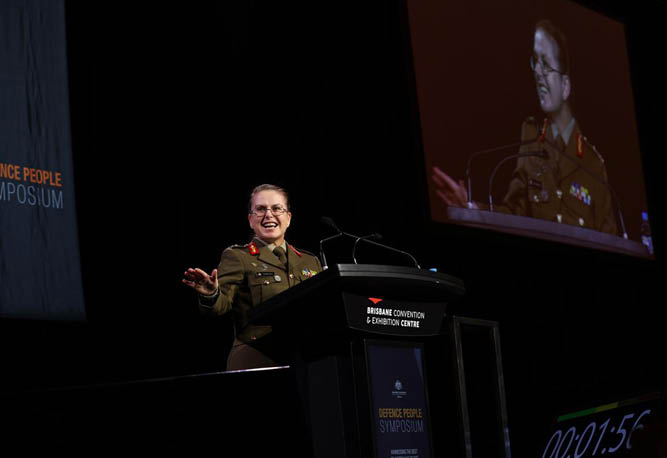Setting career preferences via a smartphone app and multi-faceted selection for commanders were two of the ideas presented at the Defence People Symposium, hosted by Army in Brisbane from June 29-30.
Almost 1000 people from Defence, the public service and industry partners gathered in person and virtually to discuss the future of Defence personnel and workforce challenges.
Deputy Chief of Army Major General Natasha Fox said the symposium was held to harness collective learning rather than operating in isolation.
“Symposiums like this are about keeping an eye to the future and developing capabilities that Defence needs,” Major General Fox said.
“They’re also about making sure we can stay agile and design for the future, not just be reactive.”
Speakers were from business, sporting and government organisations, and they shared challenges and solutions for managing people.
Military speakers from the US, UK and New Zealand also attended, with US Army Colonels Bob O’Brien and Jeff McNeil explaining a newly implemented way of choosing battalion commanders.
“The US Army Chief of Staff noted in 2018 that more time, money and resources were used to select privates for the [US Army] ranger regiment than to select battalion commanders, and he asked if there was a better way,” Colonel O’Brien said.
From there, the Command Assessment Program was developed to include psychometric, written, verbal and physical assessments to enhance candidates’ profiles. Anti-bias training was also given to the assessment panel members, and candidates received tailored feedback and recommendations for moving forward.
With the Australian Defence Force set to grow from 60,000 to 80,000 by 2040, Major General Fox said it was important that Defence harmonised processes to be more effective in growing.
She said Defence couldn’t afford to operate in stove pipes, and needed to act holistically with a focus on personnel wellbeing that could lead to longer service.
“We never talk about the joy of service and why serving is good for wellbeing,” Major General Fox said.
“If we look after people, whole of life, and wellbeing, you start to enable an environment that is positive.”













